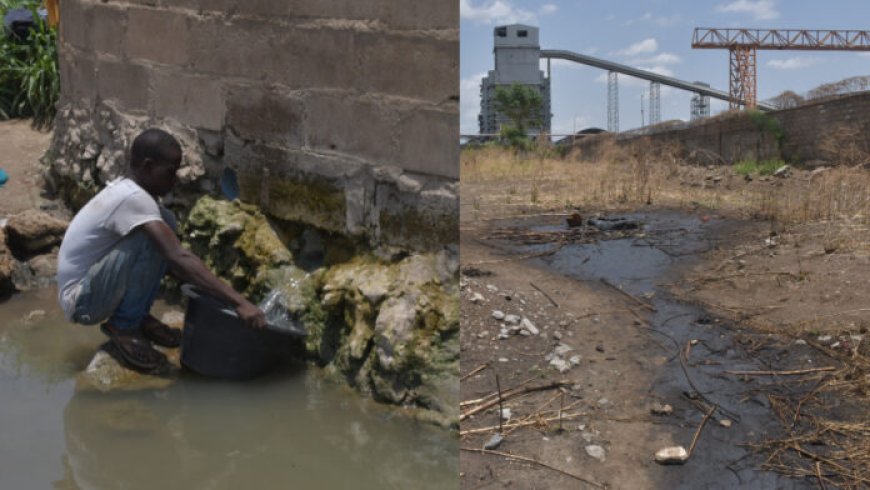Environmental crisis hits Benue communities amid Dangote Cement’s profit surge

The heated afternoon and sweltering temperature saw some residents of the Mbayion district in Gboko Local Government Area (LGA) of Benue State scampering to the Dangote Cement’s trench which overflows wastewater into their streams.
A few steps away from the trench, where women, children, and young adults fetched the water, lies an open pit that spills black oil into the soil, killing all the plants in the surrounding area.
On some occasions, aquatic creatures such as fish and frogs were found dead, floating on top of the brackish water, apparently as a result of the pollution, several sources in the district told The ICIR.
After filling four gallons of 25 litres each, a 23-year-old resident, Terver Sesugh, who should ordinarily be happy for getting water, forlornly declared that the usage of the water would rather add more to his problems.
“This water itches my body. The only clean water around here is inside the Dangote Cement factory, but we don’t have access to it,” Sesugh remarked.
He added that only people who worked at the factory or had business to transact inside were allowed into the premises.
A visit to the waterside two days later, on April 6, led to another encounter with 28-year-old James Terungwa who collaborated that in addition to itching of the body, he suffered blurriness after bathing with the water.
Even though they know that the water is unhealthy for use, Mbayion residents are forced to utilise the only option (wastewater) available.
With seven council wards, Mbayion district has a population of 361,325, according to Nigeria’s last population census conducted in 2006, which The ICIR obtained from the Gboko office of the National Population Commission (NPC).
Growing water crisis
Orver Yongu, the national president of the Yion Development Association (YIDA), said over five hundred households are affected by the water crisis. YIDA is the community’s socio-cultural group at the forefront of the struggle for environmental remediation.
An environmental activist, Zack Uchir, said it was unfathomable that human beings were forced because of their precarious circumstances to use wastewater, “but this is where we find ourselves.”
“Once polluted with the black oil, the streams can no longer be used for domestic or even irrigation purposes. Our plants wither away once they have any contact with the water,” he said.
Water harmful on human body – NAFDAC, WaterAid Nigeria
The ICIR visited three local clinics to investigate common ailments among residents. Two health workers confirmed that skin problems, caused by the wastewater, were the leading ailments.
Another clinic declined to disclose information for fear of victimisation, despite the reporter’s assurance of anonymity. A health worker at one of the clinics stated: “Almost all the patients with skin infections have come in contact with the wastewater.
“Other ailments such as typhoid and high blood pressure are also common here. We usually prescribe some antibiotics for treatment, but the people need to stop using that water,” she said.
To assess the pollution level, the reporter submitted the water sample to the National Agency for Food and Drug Administration and Control (NAFDAC) in Abuja for laboratory analysis.


The result, certified by the monitoring agency, revealed high alkalinity and nitrite levels above acceptable specification, as well as salmonella and particles.
The accumulation of these pollutants renders the wastewater dangerously unsafe for use on the human body, said WaterAid Nigeria’s head of advocacy, policy and communications, Kolawole Banwo.
Banwo stated that consuming nitrite-contaminated water exposes families to methemoglobinemia, also known as blue-baby syndrome, a medical term for a disorder in children which results in too little oxygen being delivered to their cells.
“What we have learned in the cause of our work about nitrite is that it compromises the lives and future of children from birth, that is if they live long enough.
“If a whole population is exposed to such water, it means that the heart of the community’s ability to reproduce across generations and live meaningful lives is threatened,” Banwo added, emphasising that alternative water sources should be “provided as soon as possible.”
Warning against nitrite contamination, the World Health Organisation’s (WHO’s) Guidelines for Drinking-water Quality says children below the age of six may become seriously ill and, if untreated, die.
The presence of high alkalinity explains why Mbayion residents experience itchy and chalky skin after coming in contact with the wastewater, according to a health expert at the Federal Ministry of Health who asked to be anonymous because he was not authorised to speak.
The burden of Industrial wastewater in Nigeria
The United Nations International Children’s Emergency Fund -UNICEF, says 70 per cent of water in Nigeria at the point of consumption is contaminated and that “children are the most affected.”
Jane Bevan, UNICEF’s chief of Water, Sanitation and Hygiene (WASH) programme disclosed that 117,000 children die in Nigeria each year due to water-related illnesses – the highest number of any nation.
Bevan also noted that 78 million children in Nigeria were at risk from the convergence of water-related threats such as scarcity and pollution.
Crisis persists in Mbayion despite Dangote’s pledge to tackle waste, climate change
Meanwhile, at the 12th Africa Cement Trade Summit which was held in November 2023, in Abidjan, Côte d’Ivoire, the Group Managing Director of Dangote Cement plc, Arvind Pathak, reportedly said the company was positioned to tackle Africa’s waste and climate change issues through sustainable production of cement.
“Dangote Cement is dedicated to environmental sustainability and combating climate change. We have implemented a robust climate change policy that aligns our operations with global climate goals.
“The environmental pillars of the company define the ways of entrenching sustainability by identifying, measuring and mitigating actual and potential environmental impacts of operations,” Pathak said.
read more.......



 moderator
moderator 





